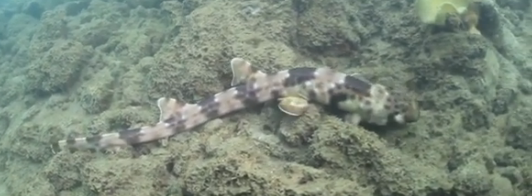
A new species of shark that "walks" on the ocean floor that was discovered in Indonesia has been identified. Researchers first photographed the epaulette shark, or Hemiscyllium halmahera, in 2008 when it was officially identified as a new species in the science journal "Aqua." The shark manuevers about the ocean floor by moving its pectoral and pelvic fins while it forrages for food along the rocks and reefs. It is narrow-bodied and marked by distinct spots. The creature makes its habitat along the eastern coast of Indonesia, near the island of Halmahera.
"This is the third walking shark species to be described from eastern Indonesia in the past six years, which highlights our tremendous shark and ray biodiversity," said shark expert Fahmi. "We now know that six of the nine known walking shark species occur in Indonesian waters, and these animals are diver favorites with excellent potential to help grow our marine tourism industry."
The species is just one of nine different types of "walking" sharks that live across the world. Six of the nine species, however, live near Indonesia, a country that sports at least 218 different types of sharks and rays in its surrounding waters. Indonesia is also home to 75 percent of the world's coral species, according to Discovery. Scientists hope that the discovery will bring an awareness to the country's biodiversity and generate a newfound respect for its ocean-dwellers. As it stands, Indonesia is one of the top exporters of dry shark fins and products made from rays and skates. Researchers say, however, that the longterm cost-effectiveness of conservation, which would bring in $1.9 million over the course of the lifetime of an individual shark, is much more significant than the cost of its meat, which sells for between $40 and $200.
"The discovery comes at a time when Indonesia is significantly ramping up its efforts to protect shark and ray species that are now considered vulnerable to extinction, including whale sharks and manta rays," said Emmeline Johansen of Conservation International's Asia Pacific Field Division.
© 2025 Latin Times. All rights reserved. Do not reproduce without permission.




